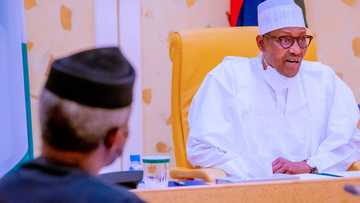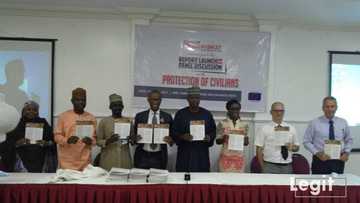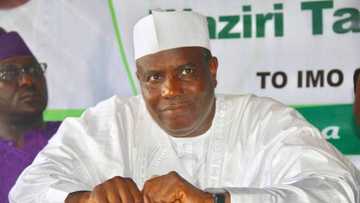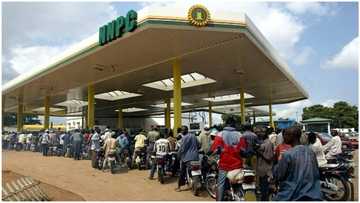Ahead of 2023, INEC Reveals How Politicians Undermine Commission's Efforts
- All efforts are being put in place by various stakeholders to deliver free, fair and credible elections to Nigerians all over the world
- One of such efforts is the possibility of full incorporation of technology in Nigeria's voting process by the Independent National Electoral Commission (INEC)
- However, INEC has decried the continued interference and undermining of some of its efforts by Nigerian politicians
PAY ATTENTION: Click “See First” under the “Following” tab to see Legit.ng News on your Facebook News Feed!
The Independent National Electoral Commission (INEC) has accused politicians across Nigeria of undermining the commission's effort to deliver seamless elections.
The resident electoral commissioner in Akwa Ibom state, Mike Igini, said while the commission focuses on best ways to eliminate some of the hitches and challenges encountered in elections, politicians are hellbent on frustrating efforts aimed at achieving a seamless process.

Source: Facebook
Igini made the disclosure at stakeholders roundtable on electoral technology hosted by YIAGA in partnership with the European Union Support to Democratic Governance in Nigeria (EU SDGN).
The roundtable which took place on Tuesday, November 30, in Abuja and attended by Legit.ng aimed to assess the deployment of electoral technology in Nigerian elections and examine its contributions to election administration, electoral integrity, and citizens participation.
PAY ATTENTION: Subscribe to Digital Talk newsletter to receive must-know business stories and succeed BIG!
It also created a platform that could help set common principles for the purpose of guiding the deployment of electoral technology in future elections in Nigeria.
Continuing, Igni said that even with the use of smart card readers in an election, other challenges like the failure of the political class to mobilize Nigerians cannot be neglected.
He said the introduction of the SCR was followed by the use of an incident form to ensure that all names captured by the card reader correspond with what is on the register.

Read also
PDP chieftain lauds Buhari's rejection of Direct Primaries in Electoral Act amendment, gives reasons
He added that despite this effort, the incident form was abused creating unforeseen challenges for the commission.
Igini also explained that the high cost of an election in the country can sometimes be attributed to those who work tirelessly to manipulate the electoral process at one point or the other.
Igini said:
“All cost of election in Nigeria is on account of people who are out to manipulate the process and that are why we are like grasshoppers because when the commission plans for a long term the politicians are out there to undermine what we are doing.
“Like we are planning now to have the BVAS out there and they are trying to undermine that process."
"You put in place something for the interest of the nation there are people out to undermine the process, and we do nothing with them or make effort to arraign them in court."
Igini said the politicians go the extra mile to find ways to undermine the efforts of the commission in building an electoral process worthy of emulation.
Roles of key stakeholders in voter education, mobilisation
The INEC REC further called for engagements with political key players in Nigeria's election to ensure that everyone is on the same page in building strong structures that could lead the country to deliver on free, fair and credible elections.
Decrying the constant change of state police commissioners close to the election period, Igini said such actions are issues of great concern.
He also said that successful elections are not technologically driven but successful elections are technologically assisted.
Also speaking, Chidi Nwafor, the director of ICT, INEC said the use of technology in elections involves the process of registration, authentication of registered voters, the transmission of results from polling units to collation centres and beyond.
Nwafor said:
"You have to make it easy for everyone to register and you have to make it possible for everyone to vote at the same time and the results at the units have to tally when they get to the collation centres."
Challenges of human interference in the use of technology in elections
He also said that the commission is trying its best to ensure the elimination of human interference in the election processes.
He added:
"When you go to the field, we want to be sure that you are are the one voting, we don't want you to go there and be declined; again if the registration is not authenticated, then there is a problem."
"Our authentication process was better in 2015, got better in 2019 and we have continued to find loopholes are we keep correecting them to ensure we have minimal errors or human intefference'
In his address, the president of the Nigerian Computer Society, Professor Adesina Sodiya, said Nigeria is ripe for an e-voting system.
Sodiya said:
“Nigeria is ripe for e-voting; majority of our people do not want to queue under the sun but if they know you have a strong e-voting system to cast their vote from the comfort of their home they would embrace it."
"What we are looking at is the implementation of the e-voting system.”
However, disagreeing with Sodiya, the chairman of the Senate committee on media and public affairs, Ajibola Bashiru said Nigeria is not ready to adopt the e-voting system.
Bashiru said having travelled across the country especially in some of the rural areas, one can affirm that issues of technology and its use sound alien to some people.
He said:
“As a grassroots and practical politician, I have moved around and yes it is easier for us who live in the municipality of Lagos, Port Harcourt and Abuja to talk about digital coverage."
“There are other places you visit you to see the problem of infrastructure. There is still a network problem in most parts of the rural areas."
“We cannot insulate INEC of overrating their capability and potentials on what they can do. With the level of deployment and training, it gives a lot of room for our concern whether for now, we can deploy the card reader."
A commendation for lawmakers of the National Assembly
For the executive director of YIAGA, Samson Itodo, the National Assembly deserves commendation for the amendment of the Electoral Act in line with changes and challenges in the election process.
Itodo who gave a welcome address said technologies are great for elections as they enhance citizens participation and electoral transparency.
He however warned that technology can undermine the integrity of elections and limit the participation of citizens in the electoral process.
He asked:
“And our goal is in fostering this conversation is based on our own experience as Nigerians. What has been our experience with technologies in our elections, have they improved the qualities of our elections? Have they enhanced its integrity?”

Read also
Yiaga Africa launches analysis report of youth and female candidacy ahead of FCT council elections
Buhari writes INEC chairman, AGF over Electoral Act Amendment Bill
Meanwhile, Legit.ng previously reported that President Muhammadu Buhari has written a letter to the chairman of INEC and the Attorney General of the Federation on steps to take over the Electoral Act Amendment Bill
The bill was recently passed by lawmakers of the National Assembly and sent to the president for his assent.
The president has however sought the best advice from experts in the field of the electioneering process and legal matters over the bill.
Governor Yahaya Bello speaks on harmonisation of the Electoral Act Amendment Bill
Also, the Kogi state governor, Yahaya Bello, had reacted to the harmonisation of the Electoral Act Amendment Bill by the lawmakers of the National Assembly.
The governor said that claims that some of his colleagues from other states are set to undermine the political stance of lawmakers are false.
He said no governor across the country issues their tickets to members of the National Assembly as widely reported.
Source: Legit.ng







